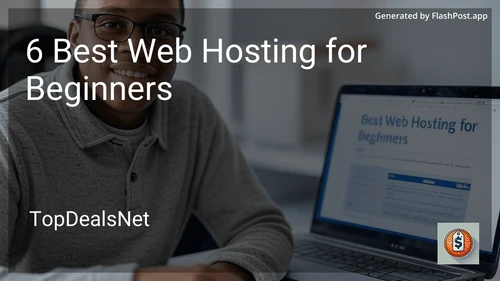Best Web Hosting for Beginners in March 2026

Vultr
- High-Performance Cloud Infrastructure
- Worldwide Server Locations
- One-Click Apps
- 24/7 Support
- DDoS Protection

DigitalOcean
- App Platform (PaaS)
- Monitoring & Alerts Built-in
- Predictable Flat Pricing
- Extensive Developer Tutorials
- Private Networking Between Droplets

Bluehost
- User-friendly interface
- One-click WordPress installation
- 24/7 customer support
- Free domain for the first year
- Free SSL certificate
- 30-day money-back guarantee

HostGator
- Easy website builder
- 24/7 customer support
- 99.9% uptime guarantee
- Free website transfer
- One-click installs
- 45-day money-back guarantee

SiteGround
- Excellent customer support
- Free daily backups
- Free CDN and SSL
- Managed WordPress hosting
- 30-day money-back guarantee
- Easy-to-use interface

Hostinger
- Affordable pricing
- User-friendly control panel
- Free website builder
- Free SSL certificate
- 24/7 customer support
- 30-day money-back guarantee

DreamHost
- Unlimited traffic
- Free domain for the first year
- Free SSL certificate
- Automated backups
- 97-day money-back guarantee
- Easy-to-use panel

A2 Hosting
- Anytime money-back guarantee
- Free site migration
- 24/7/365 support
- Turbo servers for faster loading
- Free SSL certificate
- One-click installs
Navigating the world of web hosting as a newcomer can be a daunting task. Whether you’re launching your first blog, building a personal portfolio, or starting an online business, choosing the right web hosting service is crucial to your online success. This guide aims to simplify the process, offering insights into web hosting and tips to find the best web hosting for beginners.
Understanding Web Hosting
Before diving into how to select a web hosting provider, it's essential to grasp what web hosting entails. At its core, web hosting is a service that allows individuals or organizations to post a website or web page onto the Internet. A web host, or hosting provider, allocates space on a server for a website, making it accessible via the web.
Key Elements of Web Hosting
When evaluating web hosting services, consider the following key elements:
- Storage and Bandwidth: Ensure the host offers adequate disk space and data transfer to accommodate your site’s needs.
- Uptime Guarantee: A high uptime percentage ensures that your site remains accessible to users.
- Customer Support: Look for providers that offer 24/7 support through various channels.
- Ease of Use: A user-friendly control panel is essential for beginners.
- Scalability: Your hosting plan should accommodate potential growth.
Types of Web Hosting
There are several types of web hosting services, each tailored to different requirements. Understanding these can aid in selecting the ideal option for your website:
- Shared Hosting: An economical choice for beginners where multiple websites share server resources.
- VPS Hosting: Offers more control and resources than shared hosting; suitable for growing sites.
- Dedicated Hosting: Provides an entire server to one client, ideal for large-scale websites.
- Cloud Hosting: A flexible hosting solution that scales based on traffic and demand.
- Managed Hosting: The provider handles server management, making it perfect for those without technical skills.
Tips for Choosing the Best Web Hosting for Beginners
Choosing a web host doesn't have to be overwhelming. Here are some tips to guide your decision:
1. Set Your Budget and Priorities
Begin by defining what you need in a hosting plan, such as budget constraints and essential features. For those conscious of expenditures, consider exploring budget-friendly hosting services that offer quality without breaking the bank.
2. Assess Your Technical Know-How
As a beginner, you’ll want a hosting provider with an intuitive, user-friendly interface. Many hosting companies offer simple one-click installations for popular applications, such as WordPress. Managed hosting services can also be beneficial as they take care of technical aspects, leaving you free to concentrate on your content.
3. Factor in Future Growth
While starting small is advisable, it's vital to consider your website's growth potential. Ensure your host offers seamless upgrades to more comprehensive plans, like VPS or dedicated hosting, when the need arises.
4. Examine the Support Options
Robust customer support is crucial for beginners who might encounter unexpected difficulties. Choose a provider with excellent customer support reviews and various communication channels, including phone, chat, and email, available 24/7.
5. Look for Value-Added Features
Many hosting providers offer additional features that enhance site performance and security. For instance, free SSL certificates, automated backups, and integrated site builders can significantly benefit novices.
6. Read Reviews and Feedback
Researching customer reviews and expert feedback can provide valuable insights into the reliability and performance of different hosting providers. If specific hosting for CMS platforms like Drupal is needed, exploring sources on drupal hosting providers can be beneficial.
Conclusion
Selecting the best web hosting for beginners combines understanding your specific needs with a knowledge of hosting service features. By focusing on critical aspects such as customer support, scalability, and value-added features, you can find a web host that supports your current objectives while allowing for future growth. Equipped with this knowledge, you can confidently embark on your web hosting journey and create a successful online presence.
